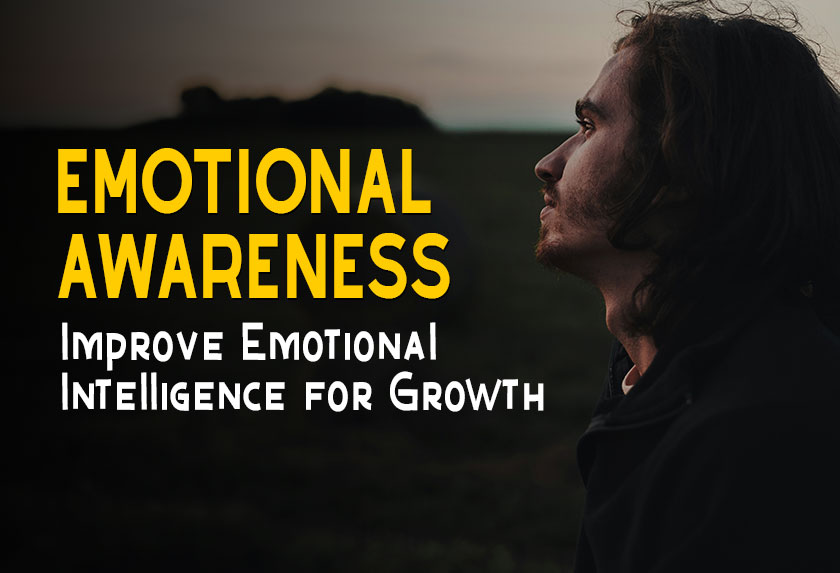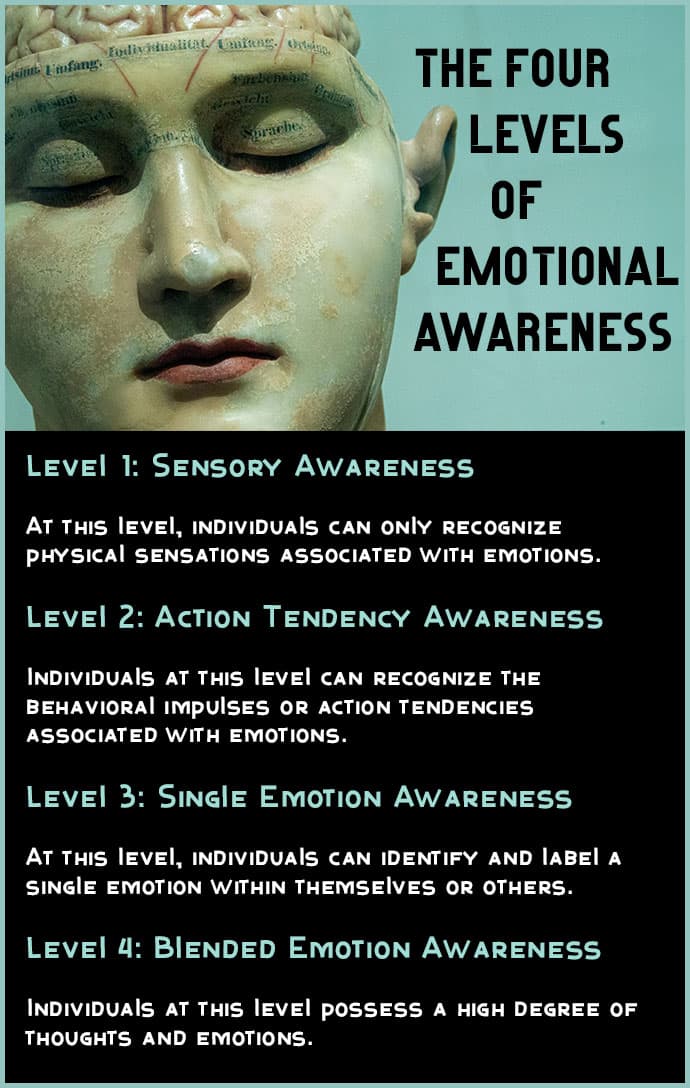Emotional awareness is the ability to recognize, understand, and manage your own emotions and the emotions of others.
It is a crucial skill that can profoundly impact every aspect of our lives, from personal relationships to professional success.
The Significance of Emotional Awareness
Emotions are a fundamental part of the human experience, and they play a vital role in shaping our thoughts, behaviors, and decisions.
We can gain a deeper understanding of ourselves and others, leading to more meaningful connections and healthier relationships.
Emotional awareness also helps us navigate challenging situations, deal with stress and anxiety, and make better decisions.
Benefits of Emotional Awareness
Improved Self-Awareness: Increased emotional awareness helps you understand your own emotions and how they influence your thoughts and actions.
This self-knowledge allows you to recognize patterns, triggers, and emotional tendencies, empowering you to make more conscious choices and respond more effectively to life’s challenges.
Enhanced Empathy and Social Skills: By understanding your own emotions, you can better recognize and empathize with the emotions of others.
This heightened empathy leads to stronger social bonds, improved communication, and more effective conflict resolution.
Better Decision-Making: Emotions can significantly influence our decision-making process.
Increased levels of EA allows you to recognize the impact of emotions on your choices, enabling you to make more thoughtful and rational decisions.
Increased Resilience: When you have a deep understanding of your emotions, you can better manage stress, anxiety, and negative emotions.
This emotional response and resilience helps you bounce back from setbacks and navigate challenging situations with greater ease.
Levels of Emotional Awareness Scale
EA is a complex concept, and individuals can exhibit varying degrees of emotional intelligence and self-awareness.
To better understand and measure EA, researchers have developed the Levels of Emotional Awareness Scale (LEAS).
The LEAS is a performance-based measure that assesses an individual’s ability to identify and label emotions within themselves and others.
It provides a framework for understanding the different stages or levels of EA.
The Four Levels of Emotional Awareness
The LEAS identifies four distinct levels:
Level 1: Sensory Awareness
At this level, individuals can only recognize physical sensations associated with emotions.
They may be able to identify bodily cues, such as a racing heart or tightness in the chest, but they are unable to label or express the underlying emotion.
Level 2: Action Tendency Awareness
Individuals at this level can recognize the behavioral impulses or action tendencies associated with emotions.
They may be able to identify the desire to run away, lash out, or withdraw, but they still struggle to articulate the specific emotion they are experiencing.
Level 3: Single Emotion Awareness
At this level, individuals can identify and label a single emotion within themselves or others.
They can recognize and name basic emotions, such as happiness, sadness, anger, or fear, but they may have difficulty understanding the complexity and nuances of emotional experiences.
Level 4: Blended Emotion Awareness
Individuals at this level possess a high degree of thoughts and emotions.
They can recognize and label complex emotional states that involve blends of multiple emotions.
They understand that emotions can be experienced simultaneously or in quick succession, and they can articulate the nuances and subtleties of their emotional experiences.
Measuring Emotional Awareness with the LEAS
The LEAS consists of a series of scenarios that describe emotional situations.
Participants are asked to identify the emotions that the characters in the scenarios might be experiencing and to explain how they would feel in those situations.
The responses are then scored based on the level of emotional awareness demonstrated.
Higher scores indicate a greater ability to recognize and label emotions, both within oneself and in others.
Implications of the LEAS
The LEAS provides a valuable tool for assessing and understanding emotional awareness.
It can be used in research, clinical settings, and personal development contexts to identify areas of strength and opportunities for growth.
By understanding the different levels, individuals can work on developing their emotional intelligence and self-awareness, ultimately leading to improved well-being, healthier relationships, and more effective decision-making.
The LEAS highlights the importance of emotional awareness as a skill that can be cultivated and refined over time, emphasizing the value of continuous self-exploration and emotional growth.
Improve Emotional Intelligence
Cultivating high emotional awareness is a lifelong journey that requires practice and dedication.
Here are some strategies to help you develop this essential skill:
Practice Mindfulness
Mindfulness is the practice of being present and emotionally aware of your thoughts, feelings, and sensations in the present moment.
By cultivating a mindfulness practice, you can learn to observe and understand your emotions without judgment, enabling you to gain a deeper understanding of your inner world.
Engage in Reflective Writing
Journaling or writing about your emotions can help you identify patterns, triggers, and insights that may be difficult to recognize in the moment.
By reflecting on your emotional experiences, you can gain a more comprehensive understanding of your emotional landscape.
Seek Feedback from Others
Asking trusted friends, family members, or colleagues for feedback on how you express your emotions can provide valuable insights.
Their perspectives can help you recognize blind spots and areas for growth, facilitating a more well-rounded social awareness.
Emotional Labeling
Developing a rich emotional vocabulary can help you accurately identify and articulate your feelings.
Practice labeling your emotions as you experience them, and explore the nuances of different emotional states to deepen your understanding.
Practice Emotional Awareness
Awareness of one’s emotions is not just a theoretical concept; it has practical applications in our daily lives.
Here are a few real-life examples that illustrate the power of higher levels of emotional awareness:
Improving Communication in Relationships
The ability to understand and manage emotions effectively, can foster deeper connections with your partner, family members, or friends.
Emotional awareness allows you to communicate your feelings clearly, resolve conflicts more effectively, and build stronger, more authentic relationships.
Managing Stress and Anxiety in the Workplace
In a fast-paced work environment, stress and anxiety can significantly impact productivity and well-being.
Emotional awareness enables you to recognize the signs of stress and anxiety, enabling you to implement coping strategies and develop a healthier work-life balance.
Making Informed Career Choices
Emotions often play a significant role in our career decisions.
Emotional awareness can help you understand emotions, your motivations, passions, and values, guiding you towards a more fulfilling and purposeful career path.
Frequently Asked Questions (FAQs)
Can emotional awareness be learned?
Yes, it is a skill that can be developed through practice and dedication.
While some individuals may have a natural inclination towards emotional awareness, it is a capacity that can be cultivated and refined over time.
How can emotional awareness benefit my relationships?
EA can significantly improve your relationships by enhancing empathy, communication, and conflict resolution skills.
By understanding your own emotions and recognizing the emotions of others, you can build stronger, more authentic connections and navigate interpersonal challenges more effectively.
Does emotional awareness have any impact on physical health?
Yes, it can have a positive impact on physical health.
By managing stress, anxiety, and negative emotions more effectively, you can reduce the risk of stress-related health issues, such as high blood pressure, chronic inflammation, and weakened immune function.
Can emotional awareness help in making better decisions?
Absolutely. Emotions can significantly influence our decision-making process.
Emotional awareness allows you to recognize the impact of emotions on your choices, enabling you to make more thoughtful and rational decisions that align with your values and goals.
How can I develop emotional awareness in my daily life?
There are several practical strategies you can implement to cultivate emotional awareness:
- Practice mindfulness and present-moment awareness
- Engage in reflective writing or journaling
- Seek feedback from trusted friends, family members, or colleagues
- Practice emotional labeling and develop a rich emotional vocabulary
Remember understanding our emotions is a continuous journey, and it requires patience, self-compassion, and a willingness to explore your inner world.
Conclusion
Emotional awareness is a fundamental skill that can transform our lives, relationships, and well-being.
By understanding our own emotions and the emotions of others, we can navigate life’s challenges with greater resilience, make more informed decisions, and build deeper, more meaningful connections.
Embrace the journey and unlock the power of your inner world today.







